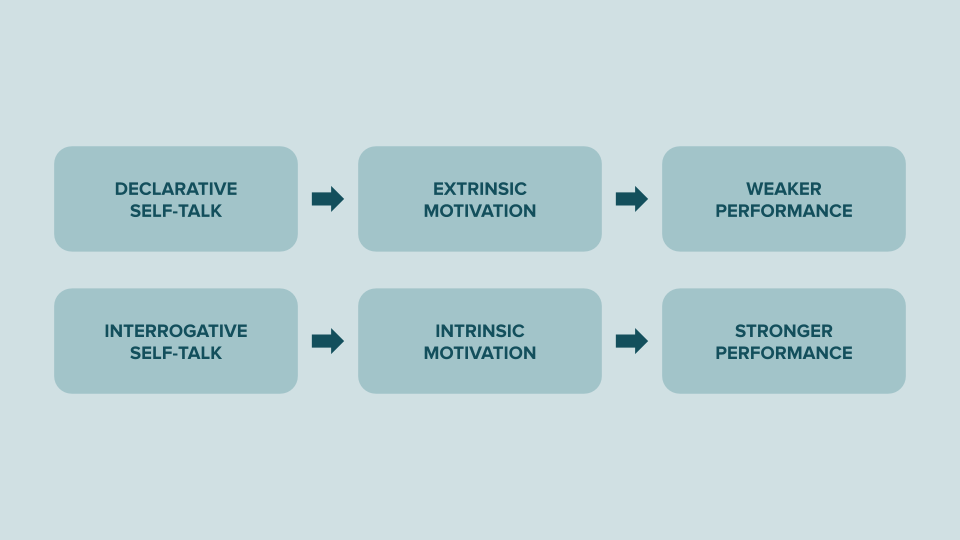We all have used self-talk to motivate ourselves. “I will meditate everyday”, “I will start going to the gym”, “I will complete this coding course”… It gives us a boost in confidence and the conviction that we will achieve our goals. Such self-talk sounds harmless, but research suggests we may benefit from being a little bit more speculative when considering our goals. People using interrogative self-talk (“Will I?”) seem to perform better than those who use declarative self-talk (“I will”). That’s called the Willpower Paradox.
Treating the future as an open question
In 2010, psychologist Ibrahim Senay and his team at the University of Illinois conducted a study where they asked participants to solve anagrams. The researchers wanted to understand the relationship between intention, motivation, and actual goal completion. In their own words: “How does the way in which you talk to yourself shape your future actions? What if asking yourself a question about your potential behavior increased the likelihood of that behavior?”
In the first experiment, the researchers found that “participants were more likely to solve anagrams if they prepared for the task by asking themselves whether they would work on anagrams as opposed to declaring that they would.” In the following experiments, merely writing “Will I” as opposed to “I will” before completing the task resulted in a better anagram-solving performance.
The researchers concluded that simply changing the structure of our self-talk from a declarative to an interrogative one could make us more motivated and more likely to achieve our goals. Asking ourselves a question is more effective than giving ourselves an order. Which may feel counterintuitive — so, why is that?
Making space for intrinsic motivation
Without realising it, many of our goals originate from an external source, whether it’s societal pressure, the desire to get a promotion at work, or the fear of being judged. These goals are driven by extrinsic motivation. While extrinsic motivation works great in the short term, it will only last as long as you consider the external rewards to be satisfying.
In contrast, with intrinsic motivation, the reason why you act is internal. You have the desire to achieve your goals in and for themselves. While intrinsic motivation takes longer to build, it also has longer-lasting positive effects on performance.
When asked about their intention to exercise, participants in one of the experiments who were primed by writing “Will I?” tended to give intrinsically motivated reasons (“Because I feel that I want to take responsibility for my own health”), whereas the ones primed by writing “I will” tended to give extrinsically motivated reasons (“Because I would feel guilty or ashamed of myself if I did not”).
That’s the mechanism behind the Willpower Paradox. By using interrogative self-talk (“Will I?”), you are giving yourself more time to build intrinsic motivation. As Ibrahim Senay and his team write: “Self-posed questions about a future behavior may inspire thoughts about autonomous or intrinsically motivated reasons to pursue a goal, leading a person to form corresponding intentions and ultimately to perform the behavior.”
In essence, declarative self-talk (“I will”) is more likely to be linked to extrinsically motivated goals. For instance, a friend just invited you to a wedding, and you are suddenly telling yourself that you will start a diet to be in shape by the time of the event, or a colleague just got a promotion and you tell yourself you will get a promotion next quarter as well.
By switching from declarative self-talk to interrogative self-talk, you will consider whether you really want to start that diet, or if you really want that promotion. If the answer is yes and you start working towards these goals, you are more likely to succeed as you will be driven by intrinsic motivation.
Next time you want to set a new goal, keep an open mind and ask yourself: “Will I?” As strange as it may feel, treating the future as an open question will increase your intrinsic motivation and thus your chances of achieving your goals.

